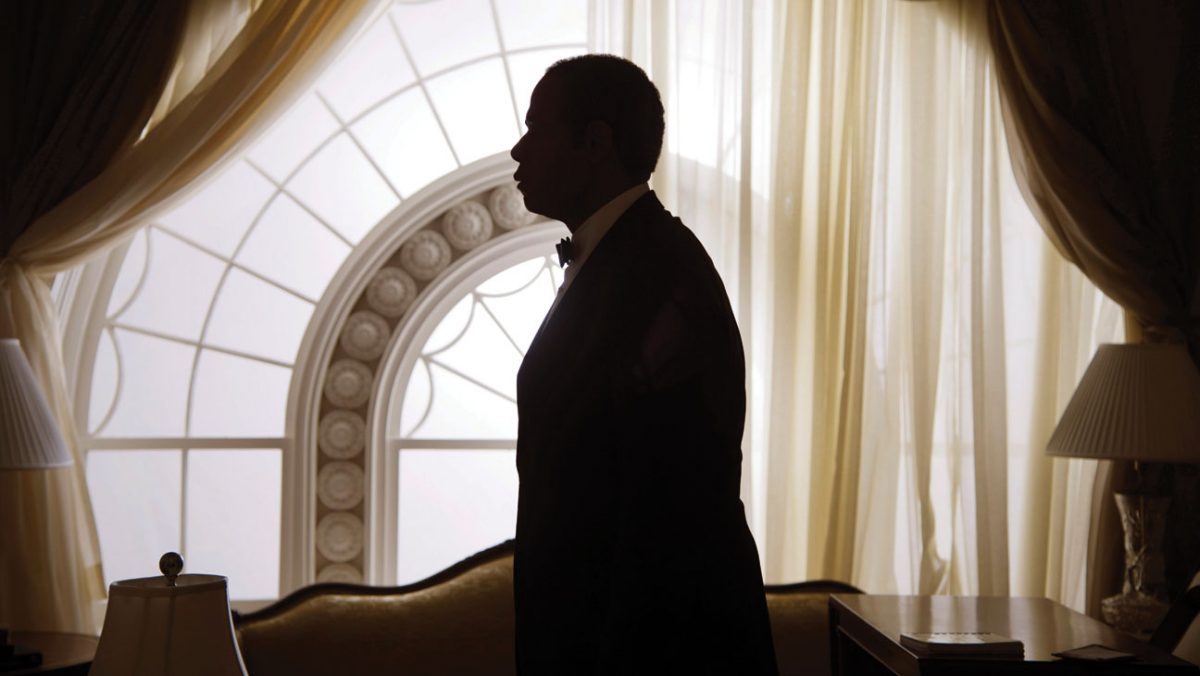 (3 / 5)
(3 / 5)2013 has been a year for many things.
With eighty-or-so years of life to cover, The Butler affords us only brief glimpses of the world through which Cecil, often wordlessly, passes. A succession of recognizable faces take on the procession of Presidents that make up the butler’s tenure.
Afforded only a few scenes each, these it’s up to actors the likes of Robin Williams and Liev Schreiber to sell these one-note appearances. William’s Eisenhower is stooped, Schreiber’s LBJ haunted by deepening involvement in Vietnam. Their roles are limited to what they did (or didn’t do) for civil rights: Gerald Ford appears only in TV footage, Jimmy Carter doesn’t even get a look-in.
Cecil’s passivity, his quiet forbearance, is contrasted with Louis’ firebrand temperament. A scene where guests rising at a Presidential dinner is juxtaposed with civil rights campaigners remaining resolutely seated at a Deep South diner is neat, but doesn’t quite connect with The Butlers’ basic view of inequality.
Resolutely tasteful, The Butler never truly delves into the power structures in American life, the prejudices, that allowed (and still allow) for institutionalized racism. Instead, it sticks to a simple, but dramatically potent representation of 20th Century domestic politics.
When James Marsden’s compassionate, martyred JFK says that he never understood what the black community went through till he viewed it for himself, it feels like the remit for the whole film: illustrative as opposed to analytical; a senior school sociology lesson disguised as cinema.
Meanwhile, The Butler has assembled perhaps the best black supporting cast since The Help (Tate Taylor’s otherwise patronizing, overrated gloss on the crusading white woman). Terrence Howard, Cuba Gooding, Jr., Lenny Kravitz – all make honorable appearances. Oprah Winfrey’s turn as Cecil’s loyal, long-suffering wife, who struggles with loneliness and alcoholism, is the stuff that Best Supporting Actress nominations are made of.
While not as striking or memorable as many of its predecessors to have explored issues of race and power, the film is still superficially rewarding. Vanessa Redgrave briefly plays the decorous mother of Pettyfer’s plantation owner while Joan Fonda is Nancy Reagan in a blink-and-you’ll-miss-her cameo. Again, the casting is phenomenal if showy.
As President’s come and go – John Cusack as an understated “Tricky Dick” Nixon, Alan Rickman’s unctuous Ronald Reagan – Louis comes to understand his estranged father’s reticence while Cecil, worn down by years of silent struggle, finally embraces the need for action, however symbolic.
Amidst images of Federal troops at Little Rock and helicopters touching down in the Far East, there’s a subtle emotionality to The Butler that sneaks up on you: Cecil Gaines and his pocket-watch tirelessly measuring out the seconds; the movement towards change that, in the words of Sam Cooke, really must be gonna come.
Though limited and somewhat reductive – the film ends with Obama’s inauguration, as though that marked the end of racism – The Butler is unashamedly middlebrow and mainstream, but more accessible, perhaps, than McQueen’s 12 Years.
Though it lacks the same potency and resonance, Lee Daniels The Butler may prove the more resilient for it.
